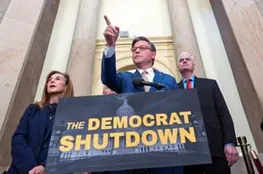With the U.S. elections fast approaching, investors are keen to understand how the political outcome might impact the markets. WisdomTree's Global CIO, Jeremy Schwartz, and Senior Economist Jeremy Siegel offer their perspectives on how a Republican or Democratic victory could influence the equity and bond sectors. They predict significant implications for bond market volatility in particular.
Jeremy Siegel notes that bond markets are poised for fluctuations depending on the election results. A Republican win could push bond yields upwards by at least 20 basis points, driven by anticipated tax cuts and increased fiscal spending. Such a scenario may introduce inflationary pressures, potentially leading to tighter monetary policies, which could offset any short-term gains in equities. Conversely, a Democratic victory might bring stability to bonds through moderated spending and a pro-growth fiscal stance. Kevin Flanagan, head of fixed income strategy at WisdomTree, suggests that Democratic policies could create a predictable, low-volatility environment, stabilizing rates and alleviating inflation concerns.
In an environment of divided government, bond markets might experience stability through legislative gridlock, which would limit significant fiscal changes and control deficit expansion. When it comes to equities, the political outcome will create distinct opportunities across sectors, especially for growth-oriented and infrastructure investments. A Republican administration is likely to favor the tech-heavy Magnificent Seven stocks, including Meta Platforms, Apple, Alphabet, Microsoft, Amazon, Nvidia, and Tesla. These stocks could benefit from policies like extended tax cuts, reduced regulation, and potential capital gains exemptions.
The Roundhill Magnificent Seven ETF provides exposure to these stocks, along with other tech-centered ETFs such as the Invesco QQQ Trust and the Vanguard Information Technology ETF. However, Siegel warns that rising yields might limit equity valuation gains. On the other hand, a Democratic sweep might direct support toward clean energy and infrastructure sectors. With initiatives like the Inflation Reduction Act in focus, Democrats could channel significant resources towards solar, hydrogen, and renewable energy projects. The Invesco Solar ETF offers exposure to solar stocks, benefiting from these policy shifts.
Democratic leadership may also favor international markets by reducing the likelihood of higher tariffs, thus easing trade tensions and boosting demand. Investors involved in clean energy ETFs, such as iShares Global Clean Energy and First Trust Nasdaq Clean Edge Smart GRID Infrastructure, should evaluate their positions. Small-cap stocks with considerable U.S. revenue exposure might face earnings challenges due to potential corporate tax hikes. WisdomTree recommends navigating the election landscape with a diversified investment strategy.
Given uncertainties, blending strategies like private credit, inflation hedges such as gold, and international exposure with currency hedging could help investors manage potential risks. Trade policies, inflation, and the Federal Reserve’s actions will influence post-election strategies, making diversification crucial. As the election results unfold, WisdomTree underscores a divided outlook for investors, highlighting the unique opportunities and risks each scenario presents, from potential gains in the Magnificent Seven stocks to strengthening the bond market. Investors should remain attentive to these dynamics in the coming weeks.
























